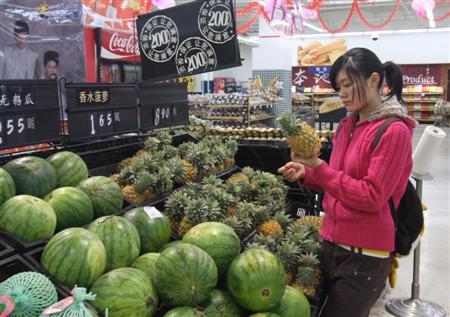
A customer shops for fresh fruit at a Wal-Mart supermarket in Loudi, Hunan province. The world's leading retail chain is using its Direct Farm Program in China to reduce operating costs, increase farmers' incomes and promote 'green' agriculture practices. [Newsphoto]
It was the third time for Wang Jianjing, a 58-year-old Beijinger, to buy winter jujube (dongzao in Chinese) within a week at a Wal-Mart hypermarket located in Wangjing, a residential community in northern Beijing.
"Winter jujube is just in season now. The fruit sold here is sweet, juicy and crisp. I also found the price (18 yuan per kg) is even lower than that at the open market," said Wang, who recently bought 2 kg as an after-dinner treat for a 10-member family reunion.
Nearly 700 km away, Wu Zhanjun, a farmer in Zhanhua, Shandong province, a well-known dongzao planting base in China, said he was pleased that 7,500 kg of his winter jujube was sold directly to Wal-Mart at 12 yuan (29 cents) per kg - 2 yuan higher than the purchasing price offered by local dealers.
"They (Wal-Mart) are also responsible for transportation, always a headache for me," Wu said.Farm program
Both Wang and Wu are benefiting from the Direct Farm Program, under which Wal-Mart Stores Inc cooperates with the Ministry of Commerce and the Ministry of Agriculture to directly purchase agricultural products from farmers nationwide.
 Doug McMillonThe program is based on the principles of guiding farmers, strengthening connections, promoting distribution channels and guaranteeing food safety, according to the government ministries.
Doug McMillonThe program is based on the principles of guiding farmers, strengthening connections, promoting distribution channels and guaranteeing food safety, according to the government ministries.Wal-Mart said that the Direct Farm Program helps farmers to upgrade their abilities to adapt to the market, encourages production and supports environmental protection in the agriculture sector.
In addition to purchasing agricultural commodities directly, the retailer is engaged in providing market information and free training sessions to farmers on scientific planting, green cultivation technologies and natural resources protection.The Direct Farm Program optimizes the industrial supply chain and food safety standards, and also increases farmers' incomes, according to Wal-Mart (China) Investment Co Ltd.
The US-headquartered supermarket behemoth started the Direct Farm Program in China in 2007.
Over the past three years, the company has set up 11 direct purchasing bases in seven municipalities, provinces and autonomous regions that cover a total area of 10,000 hectares and directly benefit more than 200,000 farmers.
Besides winter jujube purchased from Shandong, Wal-Mart directly buys vegetables from Nantong in Jiangsu province, Miyun in Beijing and Guiyang in Guizhou province.
The company purchases apples and grapes from Wafangdian in Liaoning province and organic cereals from Jianping in Liaoning province.
"Direct Farm is one of the most representative examples of our company's sustainability strategy," said Doug McMillon, president and CEO of Wal-Mart International.
"This initiative gives us a chance to bring our global experience in sustainable agriculture to China's supply chain, boosting scientific farming, environmental protection and strengthening the monitoring of food safety, which eventually delivers our Chinese customers quality products at a low price," McMillon said.
Sustainability
The Fortune 500 company recently signed a formal Memorandum of Understanding with the Ministry of Commerce and Ministry of Agriculture to launch additional initiatives.
The first was to set up Wal-Mart Fresh Food Distribution Centers to guarantee the freshness and quality of products. Wal-Mart China has set up two small-size distribution centers in Shenzhen and Guangzhou and will continue its efforts in this area, according to the company.
The second initiative was to equip the fresh food distribution centers with food testing stations to ensure food safety. The first one will be located in Guangzhou.
The third initiative was Wal-Mart's sponsorship of training sessions to ensure the sustainability of the program. The company plans to train 200 Wal-Mart trainers this year to instruct farmers.McMillon said Wal-Mart also will establish information exchange platforms and promote international information exchanges regarding the distribution of agricultural products. "We have similar programs in other nations such as America, Europe and Brazil," he said.
McMillon declined to disclose the amount of commodities Wal-Mart had purchased so far in China, but did say China is one of the retail chain's larger purchasing places.
"We have seen that the quality of commodities we purchased from China has increased, and our suppliers here are considering social responsibility and sustainable development of the environment seriously," said McMillon, who first came to China as a Wal-Mart purchaser in 1993.
Wal-Mart entered the Chinese market and opened its first store in Shenzhen in 1996. The company's global procurement operation has been headquartered in Shenzhen since 2002.
Wal-Mart's rival in China, France-based Carrefour Group, also operates a Direct Farm Program in cooperation with commerce and agriculture ministries.
Lars Olofsson, global president of the French retailing company, said during a visit to China in September that the Direct Farm Program effectively helped reduce its purchasing costs by about 20 percent.





